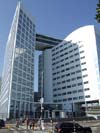
The International Criminal Court opened its second-ever trial today, where two alleged Congolese rebel leaders, Germain Katanga and Mathieu Ngudjolo, face 10 counts of crimes against humanity and war crimes, including murder, rape, sexual enslavement, and pillage. The two men are pleading not guilty.
Katanga and Ngudjolo are accused of masterminding the massacre of 200 men, women and children in an attack that took place on February 24, 2003. Prosecutors say that the two men, chiefs of staff of the Patriotic Resistance Force and the National Integrationist Front rebel groups, led over 1,000 fighters, including child soldiers, in an attack bent on destroying Bogoro, a village in Congo’s mineral-rich Ituri province.
Chief prosecutor Luis Moreno Ocampo said, "They used children as soldiers, they killed more than 200 civilians in a few hours, they raped women; girls and the elderly, they looted the entire village and they transformed women into sex slaves.”
The village was the base of rival militia UPC, led by Thomas Lubanga, whose own ICC trial began in January. But, Moreno Ocampo says that the attack went beyond the scope of a military campaign. "The plan was to wipe out Bogoro," he said. "Destroy not only the UPC camp but the whole village."
Prosecutors are planning to call on 26 witnesses, 21 testifying with identities protected from public. Two lawyers representing the 345 court-recognized victims, 10 of whom are child soldiers, are also giving opening statements, today.
In a statement yesterday, Human Rights Watch called for the ICC to recognize the complicity of officials in Congo, Rwanda, and Uganda. HRW said that the governments “provided political and military support to the ethnic-based militias in Ituri and other Congolese armed groups despite abundant evidence of their widespread violations of international humanitarian law.”
The Ituri conflict was a particularly bloody episode during the larger war in Congo that broke out following the Rwandan genocide in 1994, fueled by both ethnic dynamics and control over minerals in the region.
Today’s trial opening is an important first step in recognizing the massive war crimes and atrocities committed in Congo’s recent past. It is important that the court continues to hold other perpetrators to account to send the message, particularly to the rebels and soldiers committing atrocities today, that there is a price to pay.

